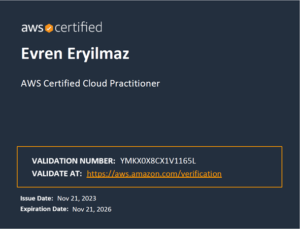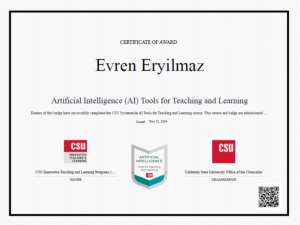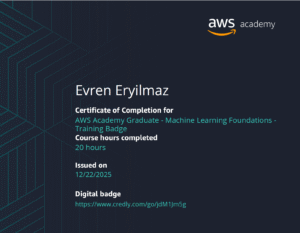Employment Experience:
May 2022 — Present: Associate Professor of Management Information Systems, California State University Sacramento
January 2021 — Present: Center for Small Business Director
August 2017 — May 2022: Assistant Professor of Management Information Systems, California State University Sacramento
June 2013 –August 2017: Assistant Professor of Information Technology Management, Bloomsburg University
April 2012–June 2013: Adjunct Professor, State University of New York Empire State College
August 2011–April 2012: Adjunct Professor, California Polytechnic University Pomona
| Certifications: |
|---|
 |
 |
 |
Teaching Experience:
Big Data Technologies for Business, California State University Sacramento
This course addresses the concepts and principles of Big Data and how Big Data can be used in the enterprise. The course starts with an overview of the fundamental principles of Big Data and its role in making better decisions and predictions in the organization. Following the fundamentals of Big Data, we address the technology, infrastructure, and applications of Big Data.
Machine Learning in Business, California State University Sacramento
Applies modern machine learning applications in business to data analysis and problem solving. Topics are presented in the context of decision support and may include knowledge representation, neural networks, genetic algorithms, rule induction, fuzzy logic, case-based reasoning and intelligent agents.
Social Media Analytics, California State University Sacramento
Social media such as Twitter, Facebook, and YouTube has transformed the businesses by putting knowledge production and communication in the hands of customers. The unprecedented volume, velocity, and variety of social media data can help organizations accomplish their business objectives. The goal of this graduate course is to prepare students to be effective leaders in a landscape that involves social media data driven business decision making.
Mobile Application Development for Business, California State University Sacramento
Provides an introduction to the art and practice of mobile application development on the Android or iOS platform. Topics will include, but are not limited to, user interface design; user interface building; input methods; data handling; and location based services. Students will design and build a variety of applications throughout the course to reinforce learning and to develop real world competency.
Advanced Database Systems, California State University Channel Islands
This graduate course covers advanced analysis of Relational Database Management Systems including their design and implementation. Topics include relational algebras, Entity Relation Diagrams, Normalization, Data Integrity Constraints, Triggers, Query Optimization, Indexing, Stored Procedures, Distributed Databases, Database Administration issues, Transaction Processing and Scheduling, Object Oriented Database Modeling, and Data Security.
Information Systems Practicum, California State University Sacramento
This course provides a comprehensive integration of MIS coursework through the completion of an information systems project. Topics include information systems development life cycle, project management, application development, database management and security.
Database Theory and Design, California State University Channel Islands
Covers database structure including: database definition, data models, semantics of relations, and operation on data models; database schemas: element definition, use and manipulation of the database schema; elements of implementation; algebra of relations on a database; hierarchical data bases. Discussion of information retrieval, reliability, protection and integrity of databases are also covered.
Systems Development Life Cycle, California State University Sacramento
Analyze, design and develop business information systems to solve information needs of businesses and organizations. Topics include various systems analysis and design techniques, tools and methods for building new and/or integrated information systems. Both oral and written reports are required. CASE methodology will be used. Note: The project will be continued in MIS 161; therefore, taking MIS 160 and MIS 161 in consecutive semesters is highly recommended.
Mobile Application Development for Business, Bloomsburg University of Pennsylvania
Provides an introduction to the art and practice of mobile application development for popular mobile platforms such as Android and Apple iOS. Students will use the software development kit (SDK) to create programs including how to craft Graphical User Interfaces (GUI), create location-based applications, and access web services.Prerequisite: ITM 510, Graduate standing or minimum of 90 credits in undergraduate courses and approval of Gradate Dean.
Java Business Application Development, Bloomsburg University of Pennsylvania
This course is designed for students with some experience in programming. The syntax of the Java programming language, object-oriented programming, creating graphical user interfaces (GUI), exceptions, file input/output (I/O), and how to create Java applications and applets in order to answer business problems in an organizational setting will be covered. This course is required for a programming minor within the Information and Technology Management program. It is also suitable as an elective for undergraduate students interested in creating Java applications.
Data Driven Web Development, Bloomsburg University of Pennsylvania
This course emphasizes the interface between websites and databases in business applications. It provides an understanding of database design and maintenance, and of how websites are connected to databases to provide real time online information for businesses and their customers.
Human Computer Interaction Management, Bloomsburg University of Pennsylvania
The dynamics of human and technology interaction management are examined with a blend of theory and practice. Provides a broad and comprehensive overview and offers specific background relating to various approaches in assessing, analyzing, designing, implementing and evaluating technology applications, and ergonomics.
Information and Technology Management Applications, Bloomsburg University of Pennsylvania
Presents an overview of information concepts through a variety of quantitative problem solving experiences using spreadsheet and database programs. Introductory business and statistical models are examined, as students identify appropriate ways to find, evaluate, and ethically use information in aid of decision-making. Examples may include budgeting, surveys, descriptive statistics, simple regression and correlation models, time value of money problems, and order entry and inventory models. This course is a core course for business students and may be taken by students in any discipline for general education points.
Introduction to Business Analytics, State University of New York: Empire State College, New York NY.
This course provides an introduction to business analytics, which helps organizations in every industry, use information for business advantage. Business analytics can be defined as the use of computerized data analysis techniques to make data-driven business decisions. The focus of this study group will be on familiarizing students to Microsoft Excel 2010, understanding the enormous market demand for business analytics, analyzing enterprise data with Microsoft Excel 2010, and learning the relationship between data analysis and business decision making.
Management Information Systems, California State Polytechnic University Pomona
Management and development of information systems in modern businesses from the customer and the MIS perspective. Information as a strategic asset. Acquisition, analysis, integration, presentation of internal and external information. Information management in international and multinational enterprises. Ethical, social impacts, and collaborative problem solving.
Interactive Web Development, California State Polytechnic University Pomona
Design and development of web applications that involve presentation, functionality and data storage. Compliance with HTML standards. Principles of modern website design. Integration of client-side scripting for website dynamics and interactivity. Development of server-side scripts for business logic and data.
Introduction to Microcomputing, California State Polytechnic University Pomona
The purpose of this course is to have each student attain a level of expertise in (1) Windows environment, (2) Word processing, (3) Spreadsheets, (4) Presentations so that they may use those skills in subsequent courses at Cal Poly Pomona without the course instructor having to spend time on basic use of the applications.
Teaching Credentials:
Summer Teaching Institute, California State University-Sacramento, Sacramento (2019-2020) (Certificate)
Preparing Future Faculty Program, Claremont Graduate University, Claremont (2007-2008) (Certificate)